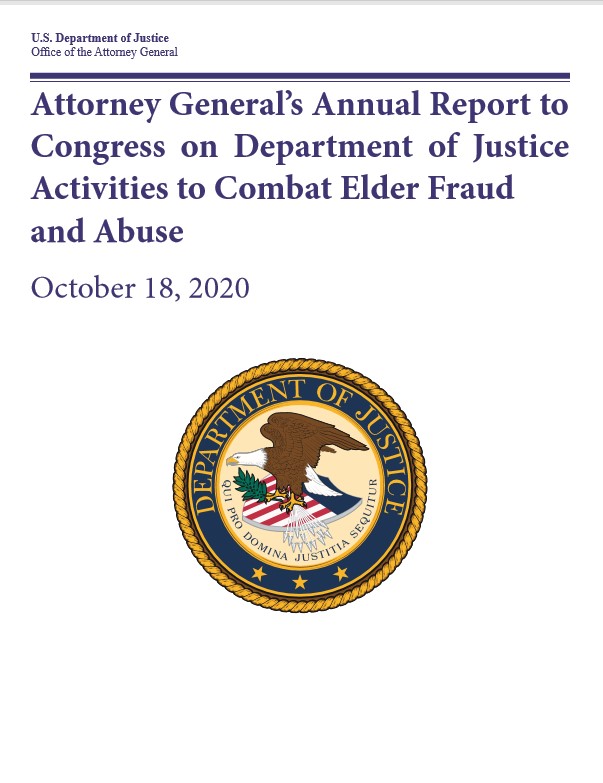
An elderly woman whose son and daughter-in-law spent all of her money, forcing her to lose her home at an assisted living community, was featured in the recently published Department of Justice’s annual report to Congress on its efforts to mitigate elder fraud.

The “Attorney General’s Annual Report to Congress on Department of Justice Activities to Combat Elder Fraud and Abuse,” includes highlights of cases, outreach events and programs from July 1, 2019, through June 30, 2020. In the report, the DOJ reported charging almost 300 cases of elder fraud.
One case highlighted in the report involved an Iowa couple that pleaded guilty to one count of wire fraud for stealing more than $200,000 from the man’s mother, who lived in an assisted living community. After spending all of the woman’s funds, she was forced to move out of the building and into their home, where she lost weight, broke her wrist and then was hospitalized. She died in March. H. David Derby was sentenced to 26 months in prison, and Patti Derby was sentenced to 24 months. They were ordered to pay $211,620 in restitution and serve a three-year supervised release after prison term.
Other report highlights featuring assisted living:
- In coordination with the Elder Justice Initiative, the Office for Victims of Crime funded 13 local programs totaling $4.9 million to develop or enhance multidisciplinary teams to better identify and respond to cases of elder abuse. Richmond, VA, expanded its elder abuse multidisciplinary team to train EMTs, 911 dispatchers, and employees of assisted living communities and skilled nursing facilities to help better prepare these frontline professionals to help law enforcement identify victims of elder abuse in its earliest phases.
- The Arkansas/Eastern U.S. Attorney’s Office developed a flyer distributed to the Arkansas Health Care Association / Arkansas Assisted Living Association warning of COVID-19 scams targeting the elderly.
- A Civil Division-Elder Justice Initiative provided an online event for attorneys, adult protective services, community services and other aging organizations on “Nursing Facilities and Assisted Living During the COVID-19 Emergency.”
- The Federal Bureau of Investigation Miami sent mailers to assisted living communities and community centers with information related to common elder fraud scams, provided DOJ and Federal Trade Commission pamphlets related to elder abuse and financial exploitation, and provided a CD of former FBI Director William H. Webster discussing his conversation with a person trying to take advantage of him.
The report also highlighted an “Elder Fraud Sweep” in March that charged more than 400 defendants with causing more than $1 billion in losses and the launch of the National Elder Fraud Hotline. The report also describes the department’s efforts to end transnational criminal organizations from committing fraud on older adults, including obtaining court orders to prevent robocalls from overseas organizations and prioritizing the annual Money Mule Initiative to disrupt the flow of fraud proceeds.
In fiscal year 2020, the FBI’s Internet Crime Complaint Center (IC3) Recovery Asset Team received 72,648 complaints from victims 60 and older — the most common victims — with reported losses of $586 million. Although extortion was the most commonly reported criminal activity, seniors lost more (approximately $167 million) to romance scams.




